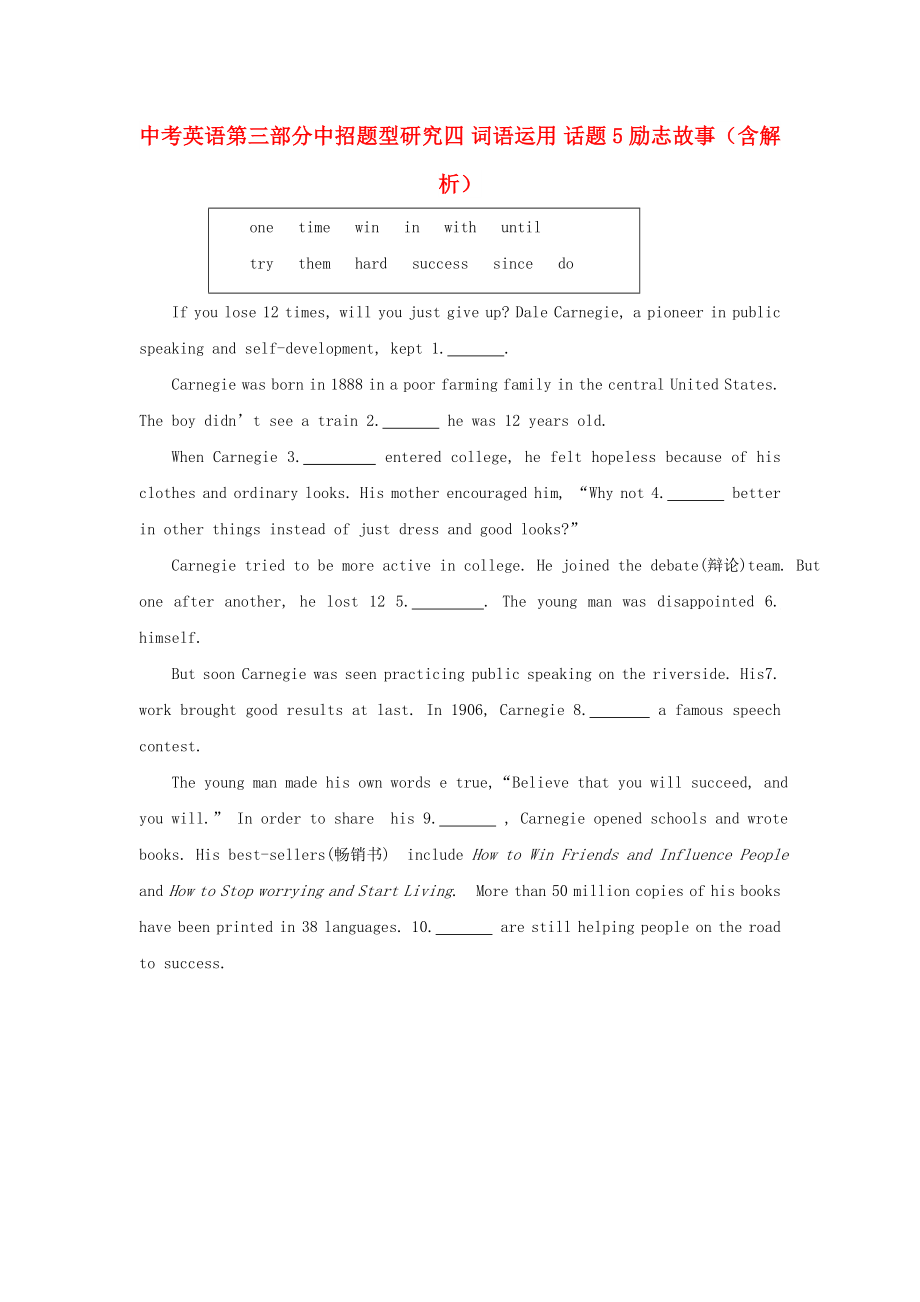《中考英語第三部分中招題型研究四 詞語運(yùn)用 話題5 勵(lì)志故事(含解析)》由會(huì)員分享,可在線閱讀�����,更多相關(guān)《中考英語第三部分中招題型研究四 詞語運(yùn)用 話題5 勵(lì)志故事(含解析)(3頁珍藏版)》請(qǐng)?jiān)谘b配圖網(wǎng)上搜索�����。
1����、中考英語第三部分中招題型研究四 詞語運(yùn)用 話題5 勵(lì)志故事(含解析)
one time win in with until
try them hard success since do
If you lose 12 times, will you just give up? Dale Carnegie, a pioneer in public speaking and self-development, kept 1. .
Carnegie was born in 1888 in a poor farming family in th
2、e central United States. The boy didn’t see a train 2. he was 12 years old.
When Carnegie 3. entered college, he felt hopeless because of his clothes and ordinary looks. His mother encouraged him, “Why not 4. better in other things instead of just dress and good looks?”
Carne
3���、gie tried to be more active in college. He joined the debate(辯論)team. But one after another, he lost 12 5. . The young man was disappointed 6. himself.
But soon Carnegie was seen practicing public speaking on the riverside. His7. work brought good results at last. In 1906, Carnegi
4����、e 8. a famous speech contest.
The young man made his own words e true,“Believe that you will succeed, and you will.” In order to share his 9. , Carnegie opened schools and wrote books. His best-sellers(暢銷書) include How to Win Friends and Influence People and How to Stop worrying and
5��、 Start Living. More than 50 million copies of his books have been printed in 38 languages. 10. are still helping people on the road to success.
【主旨大意】本文是一篇記敘文�����。講述了戴爾·卡耐基在失敗12次之后��,依然勇敢地堅(jiān)持直到成功��。文章告訴我們:堅(jiān)持就能勝利����。
【詞匯分析】
one num.一→first(序數(shù)詞)第一
time n. 次數(shù),時(shí)間
win v. 贏→wins(動(dòng)詞單三形式)→wo
6��、n(過去式/過去分詞)→winning(現(xiàn)在分詞/動(dòng)名詞)→to win(動(dòng)詞不定式)
in prep. 在……里
with prep. 具有�,表伴隨
until conj. 直到……才
try v. 嘗試→tries(動(dòng)詞單三形式)→tried(過去式/過去分詞)→trying(現(xiàn)在分詞/動(dòng)名詞)→to try(動(dòng)詞不定式)→try to do sth. 盡力做某事/try doing sth. 嘗試著做某事
them pron. 他們(賓格)→they(主格)→their(形容詞性物主代詞) →theirs(名詞性物主代詞)→themselves(反身代詞)
hard adj.
7、 & adv. 困難的(地)���;努力的(地)→work hard 努力工作
success n.成功
since conj. 因?yàn)?�,自?
do v.做→does(單三) →did(過去式)→done(過去分詞) →doing(現(xiàn)在分詞/動(dòng)名詞)→to do(不定式)
1. trying【解析】分析語境“戴爾·卡耐基����,一個(gè)公開演講和自我發(fā)展的先驅(qū),堅(jiān)持_____���?!辈⒙?lián)系上下文可知應(yīng)是堅(jiān)持嘗試�,又因keep后需加動(dòng)詞-ing形式,故填trying�。
2. until【解析】根據(jù)上文“卡耐基于1888年出生于美國中部一個(gè)貧窮的家庭?��!笨刹聹y本句說的是“直到12歲����,卡耐基才見到火車���。”根據(jù)固
8��、定詞組not...until...直到……才,可知此處填until����。
3. first【解析】本句句意為“當(dāng)卡耐基_____上大學(xué)時(shí),他對(duì)自己的穿著和普通的長相非常失望���。 分析語境并聯(lián)系上下文可知�,此處表示剛進(jìn)大學(xué)����,故填first。
4. do 【解析】結(jié)合句意�,為什么不在其他方面做得更好。why not do sth. 為什么不做某事�,故填動(dòng)詞原形do。
5. times【解析】根據(jù)上文“卡耐基盡力在大學(xué)表現(xiàn)得更加活躍�。他加入辯論隊(duì)?����!币约跋挛摹斑@個(gè)年輕人對(duì)自己很失望����?!笨芍窃谝淮斡忠淮伪M力后�,他失敗了12次。此處表示次數(shù)��,故填times����。
6. in【解析】根據(jù)上文“但是一次又一
9、次�,他失敗了12次?����!笨芍@個(gè)年輕人對(duì)自己很失望��。be disappointed in sb. 表示對(duì)某人失望�����,為固定搭配����,故填介詞in。
7. hard 【解析】根據(jù)上文“但是很快卡耐基被看到在河邊進(jìn)行公開演講?��!笨芍颂幈硎舅Φ貙W(xué)習(xí)���。故填hard�。
8. won【解析】根據(jù)上文“他辛勤的努力最終帶來了好的結(jié)果���?��!币约跋挛摹斑@個(gè)年輕人讓自己說的話成真了——相信自己,你就會(huì)成功����。”可推知“在1906年�,他贏得了一場著名的演講”,故填won��。
9. success 【解析】根據(jù)全文����,講述卡耐基的成功之路,故此處是他分享成功的經(jīng)驗(yàn),故填success��。
10. They 【解析】分析語境“_____仍然幫助那些通往成功道路上的人�。”并聯(lián)系上文可知����,與上文的books保持一致,故填They���。
 中考英語第三部分中招題型研究四 詞語運(yùn)用 話題5 勵(lì)志故事(含解析)
中考英語第三部分中招題型研究四 詞語運(yùn)用 話題5 勵(lì)志故事(含解析)

